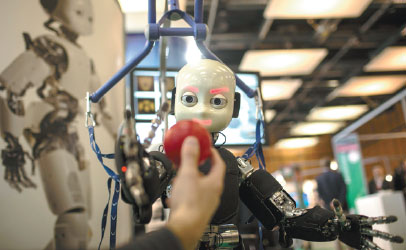Are robots job killers? Maybe, but maybe not
By Associated Press in Washington (China Daily) Updated: 2014-08-08 08:18
In 2025, self-driving cars could be the norm, Americans may have more leisure time, and goods may be cheaper. On the other hand, there could be chronic unemployment and an even wider income gap; human interaction could become a luxury, and the wealthy could live in walled cities, with robots serving as labor.
Or, little might change.
A new survey released on Wednesday by the Pew Research Center's Internet Project and Elon University's Imagining the Internet Center found that, when asked about the impact of artificial intelligence on jobs, nearly 1,900 experts and other respondents were divided over what to expect 11 years from now.
Forty-eight percent said robots would kill more jobs than they create, and 52 percent said technology will create more jobs than it destroys.
Respondents also varied widely when asked to elaborate on their expectations of jobs in the next decade. Some said that self-driving cars would be common, eliminating taxi cabs and long-haul truck drivers. Some said to expect the wealthy to live in seclusion, using robot labor. Others were more conservative, cautioning that technology never moves quite as fast as people expect, and humans aren't so easily replaceable.
"We consistently underestimate the intelligence and complexity of human beings," said Jonathan Grudin, principal researcher at Microsoft who recalls that 40 years ago people said advances in computer languages would kill programming jobs.
Even as technology reduced some jobs, such as secretaries and telephone operators, it created new ones, including Web marketing jobs, Grudin said. And, as Grudin and other survey responders noted, 11 years isn't much time for significant changes to take place.
Aaron Smith, senior researcher with Pew, said the results were unusually divided. He noted that in similar surveys about the Internet over the past 12 years, there tended to be general consensus among the respondents, which included research scientists and a range of others, from business leaders to journalists.
Respondents in this latest survey generally agreed that the education system is failing to teach the skills students need for the future. Smith said some survey respondents criticized the system for promoting memorization of tasks rather than creativity, teaching a "Henry Ford education for a Mark Zuckerberg economy".
Also, Smith said, some respondents concluded that jobs that don't require specifically human traits - such as empathy, ingenuity or resourcefulness - are at risk for being replaced, including low-skill blue collar jobs or even white-collar jobs that have people performing repetitive tasks.
Respondents offered a few theories about what might happen if artificial intelligence takes over some positions and fewer jobs are created.
Judith Donath, a fellow at Harvard's Berkman Center for Internet and Society, foresees chronic mass unemployment and a society in which the wealthy live in "walled cities, with robots providing the labor".
Some respondents see people returning to small-scale, hand production, and an appreciation would grow for products with the "human touch". Others thought people could enjoy abundant leisure time in which to pursue personal interests.
Stowe Boyd, lead analyst on the future of work at Gigaom Research, said if, as he predicts, widespread joblessness comes to pass, humanity would have to confront its deeper purpose.
|
The iCub robot trying to catch a ball during the Innorobo European summit, an event dedicated to the service robotics industry, in Lyon, central France. The iCub robot, created by the Italian Institute of Technology, is used for research into human cognition and artificial intelligence. Laurent Ciprian / Associated Press |
(China Daily 08/08/2014 page10)











